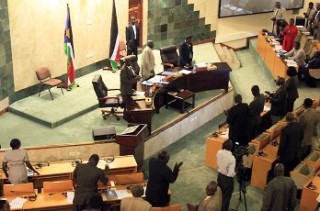Lawmakers endorse South Sudan’s EAC membership
May 23, 2016 (JUBA) – South Sudan lawmakers have unanimously supported the nation’s membership to the East African Community (EAC) at a special parliamentary sitting, despite opposition’s outcry.

South Sudan was admitted to the five nation bloc this year, five years since the application was dropped at the headquarters in Arusha, Tanzania. Uganda, Rwanda, Burundi and Kenya are other members of the EAC, first established in the 1970s.
Philip Thon Leek, chairperson for foreign affairs and international cooperation, presented the motion in parliament on Tuesday, outlining possible benefits in joining the group.
“South Sudan will have a chance to work with powerful investors especially for large infrastructure projects [such as Africa power master plan, East Africa network, East African railway]. This will enable South Sudan to integrate its oil pipeline projects in addition to transportation of imports and exports cheaply,” said Thon.
Members of the main opposition Democratic Change (DC) Party protested the sitting, describing it as illegal since the Transitional Government of Nation Unity (TGoNU) was established under the terms of peace agreement signed last year.
Onyoti Adigo, the leader of minority in parliament said there should be no more parliamentary business without reconstitution of the transitional national legislative assembly as stipulated in the peace agreement signed in August 2015 to end 21 months of fighting between the government of President Salva Kiir and armed opposition faction led by Riek Machar.
“The assembly should be expanded to 400 members and there is no need to continue with any business without the new leadership in the house,” Adigo told reporters on Monday.
The opposition lawmaker is also critical on the disadvantages posed by joining the EAC because South Sudan will be a dumping ground and receiver without exporting anything to southern neighbouring countries of Uganda and Kenya.
Philip Thon Leek, an MP representing Duk county and a former governor of Jonglei state, agreed that there are challenges amidst the opportunities for South Sudan in the EAC.
“Job opportunity is one of the major disadvantages that will be felt immediately due to disparity in the level of education and technical skills. South Sudan has only 27% literacy rate compared to 78% in partner states,” he said.
“Definitely after joining the East African Community, some of the phenomena of white color job will follow suit. This will be true of international NGOs operating in the country,” he said, emphasizing that many South Sudanese will be outcompeted in the job markets if South Sudan open her borders to experts from neighbouring countries.
He said local industries will be affected negatively, stating their growths will be hampered because “established industries will take over the market.”
He said the government now has a duty to promote local growth and development.
(ST)
